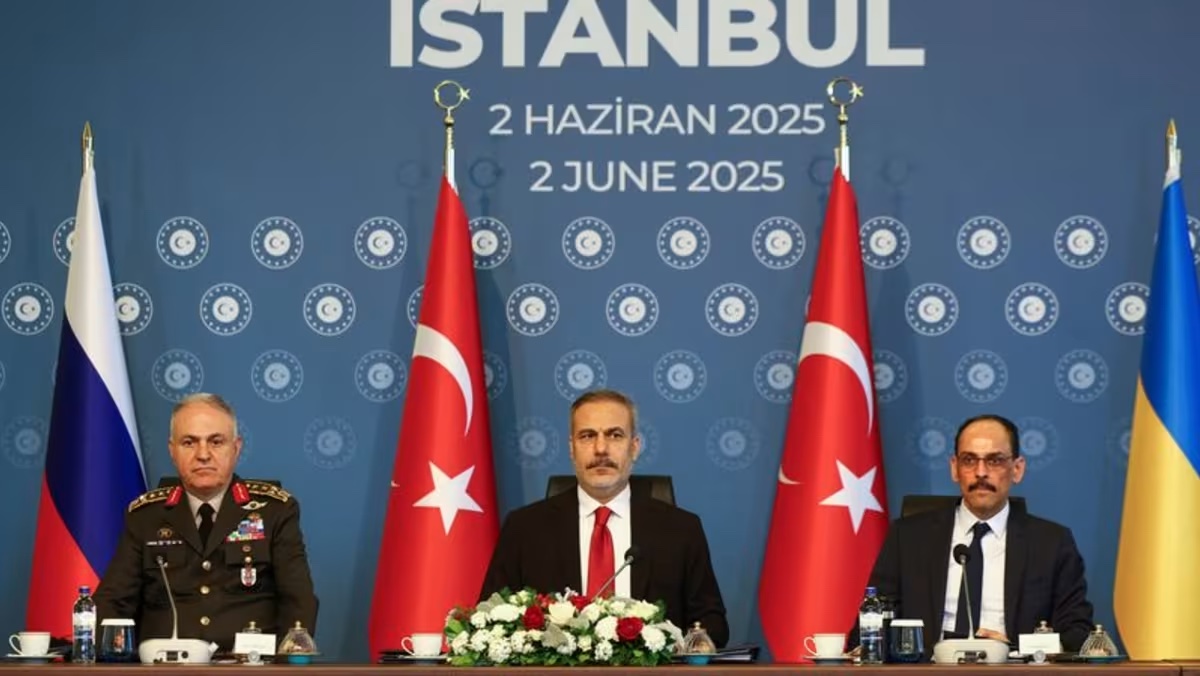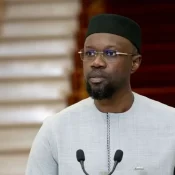
Russia lays down harsh conditions during peace negotiations with Ukraine
During peace talks on Monday, Russia informed Ukraine that it would only consent to conclude the war if Kyiv relinquishes significant new areas of territory and agrees to restrictions on the size of its military, as reported by Russian media in a memorandum.
The terms, formally presented during negotiations in Istanbul, underscored Moscow’s unwillingness to yield on its enduring war objectives, even in light of U.S. President Donald Trump’s appeals to halt the “bloodbath” in Ukraine.
Ukraine has consistently dismissed the Russian conditions as equivalent to capitulation.
Delegations from the opposing sides convened for just under an hour, marking only the second round of negotiations since March 2022. They reached an agreement to exchange additional prisoners of war, prioritizing the youngest and those most critically injured, and to return the remains of 12,000 fallen soldiers.
Turkish President Tayyip Erdogan characterized the gathering as significant and expressed his desire to facilitate a meeting in Turkey that would include Russia’s Vladimir Putin, Ukraine’s Volodymyr Zelenskiy, and Trump.
However, no progress was made on the suggested ceasefire that Ukraine, along with its European allies and Washington, has been advocating for Russia to agree to.
Moscow claims it is pursuing a long-term resolution rather than merely a temporary halt in hostilities; Kyiv asserts that Putin is not genuinely committed to peace. Trump has indicated that the United States is prepared to abandon its mediation efforts if the two parties do not show progress towards an agreement.
Ukrainian Defence Minister Rustem Umerov, leading Kyiv’s delegation, stated that Kyiv has developed its own peace roadmap and will consider the Russian document, though he did not provide any immediate remarks on it.
Ukraine has suggested conducting additional discussions before the end of June, but holds the view that only a meeting between Zelenskiy and Putin can address the numerous contentious issues, Umerov stated.
Zelenskiy stated that Ukraine has provided a list of 400 children it claims have been taken to Russia, yet the Russian delegation has consented to focus on the return of only 10 of those children. Russia claims that the children were relocated from conflict areas for their safety.
RUSSIAN REQUESTS
The memorandum from Russia, released by the Interfax news agency, stated that resolving the war would necessitate international acknowledgment of Crimea—a peninsula annexed by Russia in 2014—and four additional regions of Ukraine that Moscow asserts as its own territory. Ukraine would need to pull back its forces from all of them.
Moscow reiterated its demands for Ukraine to adopt a neutral status, excluding NATO membership, while also insisting on the protection of Russian speakers’ rights, the establishment of Russian as an official language, and the implementation of a legal prohibition against the glorification of Nazism. Ukraine dismisses the Nazi accusation as ridiculous and refutes any claims of discrimination against Russian speakers.
Russia has also outlined its conditions for a ceasefire as part of a peace settlement, offering two options that seemed unlikely to gain traction with Ukraine.
The first option presented in the text was for Ukraine to initiate a complete military withdrawal from the regions of Luhansk, Donetsk, Zaporizhzhia, and Kherson. Russia has complete control over the first, while it maintains approximately 70% control over the remainder.
Option two involved a package that mandated Ukraine to stop military redeployments and agree to a suspension of foreign military aid, satellite communications, and intelligence support. Kyiv must also revoke martial law and conduct presidential and parliamentary elections within 100 days.
Vladimir Medinsky, the head of the Russian delegation, stated that Moscow had proposed a “specific ceasefire of two to three days in certain sections of the front” to facilitate the collection of deceased soldiers’ bodies.
A proposed roadmap from Ukraine, reviewed by Reuters, outlines Kyiv’s demands for any peace agreement: no limitations on its military capabilities post-deal, no acknowledgment of Russian sovereignty over territories seized by Moscow’s forces, and reparations.
Ukraine aims at the Russian bomber fleet.
The conflict has intensified, as Russia has initiated its largest drone assaults of the war and made significant battlefield advances in May, achieving its quickest pace in six months.
On Sunday, Ukraine announced the launch of 117 drones in an operation codenamed “Spider’s Web,” targeting Russian nuclear-capable long-range bomber planes at airfields in Siberia and the far north of the country.
Satellite imagery indicated that the attacks resulted in significant damage, yet the two parties provided differing accounts regarding the severity of the impact.
Military analysts from the West characterized the strikes, occurring thousands of miles from the front lines, as among the most daring operations conducted by Ukraine during the war.
Russia’s strategic bomber fleet is a component of the “triad” of forces, which includes missiles launched from both the ground and submarines, constituting the nation’s nuclear arsenal, the largest globally. Confronted with ongoing alerts from Putin regarding Russia’s nuclear capabilities, the U.S. and its allies have remained cautious during the Ukraine conflict about the potential for it to escalate into World War Three.
An official from the current U.S. administration stated that Trump and the White House were not informed prior to the attack. A former administration official indicated that Ukraine often withholds its plans for such actions from Washington for reasons related to operational security.
A UK government official stated that the British government was not informed in advance either.
Zelenskiy stated that the operation, which utilized drones hidden within wooden sheds, has contributed to restoring partners’ confidence in Ukraine’s capability to persist in the war effort.
“Ukraine asserts that we will not surrender and will not yield to any ultimatums,” he stated during an online news briefing.
“However, our intention is not to engage in conflict; we do not seek to showcase our power. We only reveal it because the adversary refuses to cease.”
All Categories
Recent Posts
Tags
+13162306000
zoneyetu@yahoo.com



